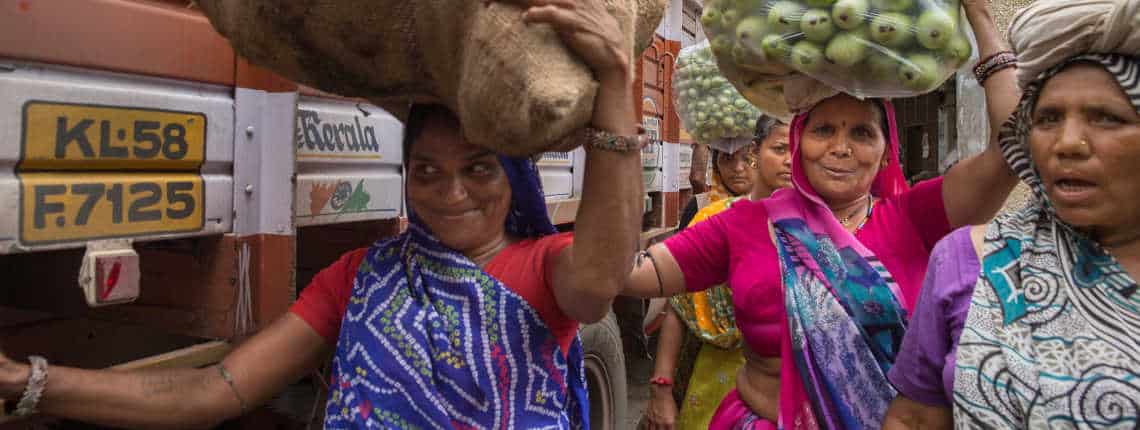The extension of social protection to all workers, including those in the informal economy, is crucial to creating better quality employment. For this to happen, it is essential that financing for social protection is increased. A new scheme for financing social protection for gig workers in Rajasthan, India, could provide lessons for other workers in informal employment. WIEGO spoke to social activist Nikhil Dey to learn more.
India’s labour welfare boards
In India, 90% of people who work, are in informal employment. Most of them are not organized.
In the early 1950s, across the country, labourers started forming boards together with other people doing the same kind of work. These boards were mandated by law and gave the workers some form of collective bargaining and collective monitoring capacity.
‘We drew inspiration for the new gig workers' law from one of the first such labour welfare boards, which was for headloaders,’ says Dey.
Because of the headloaders' welfare board, anyone who hired a headloader paid an additional fee, which would go into the fund and finance protections for the workers. The board looked beyond the need for an employment relationship, yet still managed to leverage an economic relationship to bolster financing.
The breakthrough in Rajasthan
Digital labour platforms create opportunities for workers, but the fractured nature of the work creates challenges for organizing, including around the financing of social protection. On top of that, companies operating the platforms have fought against regulation.
‘But no platform can argue against the need for welfare rights for workers – that was the breakthrough here in Rajasthan. We said, let’s legislate around social security using the model of the welfare boards,’ says Dey.
In Rajasthan, the Legislative Assembly has just passed a law creating the Rajasthan Platform-based Gig Workers Welfare Board, which will contribute towards the financing of social protection.
‘It is a very powerful idea,’ says Dey.
All platforms in the state must be registered and all workers on these platforms are automatically registered with the board. On every transaction made on the platforms there is to be a fee, and this fee will go towards financing workers welfare, through the welfare board. This does three very important things: one, it provides social security rights by law; two, it creates a mechanism for every worker to be registered and get their fair share; and three, the board has tripartite representation – from workers, the companies, and from government, which should make sure that injustice is not taking place and that all stakeholders have a voice.
The law has now been passed by the state assembly and is awaiting the governor’s signature, so that it can be implemented.
But Dey sounds a note of caution: ‘It's a first step. It does not mean that this has given gig workers the comprehensive kind of rights they need as workers. It does not mean that an employer-employee relationship has been properly defined and fully secured. Far from that.’
Financing social protection
The board is unique in that it creates a relationship between the time worked for each worker and the collected fee, rather than a fee being collected on overall transactions. Also, while the state has already announced a large sum of money to set up the board, companies will have to pay a percentage of their profits to go towards social security.
For example, let’s look at an app offering car rides: the car is the driver’s, as are the costs for fuel and insurance, and the investment of time and risk for the worker. All that the company does is aggregate on a platform and it takes between 20 and 30 percent of the earnings for just that. Under this new law, they will also have to pay into social security for the workers operating through their platforms.
Transactions between the companies and the workers will be monitored as they will flow through the board via a digital transaction system.
‘In a way, the app was an enemy for workers, but maybe the app can be turned into a friend,’ says Dey.
What comes next
Dey hopes that the creation of the welfare board for gig workers will have a knock-on effect. ‘Obviously, the first step after a law is passed is its implementation, but we hope that it will be an inspiration for advancement, for progression elsewhere, rather than mere replication.’
Already, the state of Karnataka has announced a Gig Workers Welfare Board, and the state announced it will contribute a much larger amount of money than in Rajasthan. Also the state of Tamil Nadu has announced a Gig Workers Welfare Board. These are two states with very large numbers of gig workers, larger than Rajasthan.
‘Rajasthan has set in motion the creation of the same scheme in many other states. We hope that this will become something too big to stop, that these schemes will be more progressive. We hope that what happens in Rajasthan will be improved upon in Karnataka, and further improved upon in Tamil Nadu,’ says Dey.
Nikhil Dey is a social activist in India for the empowerment of peasants and workers and is a founding member of MKSS (Mazdoor Kisan Shakti Sangathan or the Workers' and Peasants' Power Collective), a membership-based organization that fights for the right of information and advocates for a national work guarantee law in India.This blog is based on a conversation between Nikhil Day and Cyrus Afshar, Social Protection Officer within WIEGO’s Social Protection programme, on WIEGO’s Social Protection Podcast, of which Cyrus is the host. Listen to the full podcast episode: Financing Social Protection for Gig Workers in Rajasthan.
